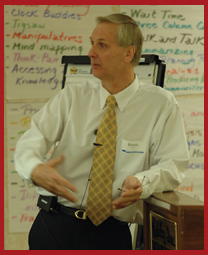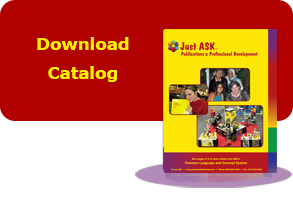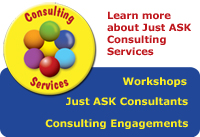
Volume I Issue II
Share this newsletter on
Maximizing Resources as an Instructional Leader

Bruce facilitating a Leading the Learning® workshop
As a veteran principal of 16 years, I took my role of instructional leader very seriously. As a result, I took the time to review educational literature, as well as books, kits, training manuals and other educational resources that came my way.
During my early years as a principal, I would occasionally purchase materials and pass on copies to my teachers. But as time went on, I came to the realization that simply placing valuable, informative and timely educational materials in the hands of teachers did very little to guarantee the materials would be used. I also learned that some of the books were literally shelved and never referred to again.
What I ultimately learned was that when I purchased educational material I wanted teachers to use, it was essential that I find ways to “get teachers into” the content. As a principal, I purchased copies of Instruction for All Students for each teacher on my staff. Additionally, I provided each teacher new to the profession, a copy of Why Didn’t I Learn This in College?
But I needed to do more. I needed to develop systems that would cause the teachers to investigate the contents of each book as thoroughly as possible, and then follow up by using the ideas in their classrooms to improve student learning.
Some methods worked better than others. I asked teachers who were being formally evaluated to keep tabs of the strategies they used in Instruction for All Students. Some teachers used post-its, some used index cards, some highlighted pages in the book, and some made notes in the book. I required the teachers to bring copies of the book to their mid- year evaluation conference and share with me how they used the ideas they had read. These conferences proved to be exciting and informative and added substance to our conversation, plus they gave me valuable data about each of the teacher’s performance.
Another method for having teachers make effective use of the book was to ask them to make presentations at faculty meetings on specific strategies they had used. I would inform the staff ahead of time to bring copies of the book to the meeting so everyone would have a personal reference during the presentations. Again, the idea worked well because teachers were sharing with other teachers.
An equally effective method was for me to present a concept from the book at a faculty meeting and allow table discussions to occur. I also ask teachers to read a section of the book prior to a faculty meeting and to be prepared to share with their fellow teachers their thoughts or insights about the topic.
The most effective method of all, however, was to offer a school-based course around the content of the book. This process worked on many levels. First, it resulted in teachers becoming more thoroughly acquainted with the content of the book. Second, it gave the teachers an opportunity to practice strategies in between class sessions, to reflect on the results of the practice, and to debrief on their experience with fellow faculty members. In- depth study, implementation, reflection and processing resulted in the most positive and permanent change in teacher behavior over time.
The bottom line is that principals must take definitive action in the use of published materials. Funds for schools are limited and purchasing materials, placing them in the hands of teachers, and having them gather dust on a shelf is a waste of time and money. Principals must be judicious and explore the best ways to have teachers use current research and add new practices to their instructional repertoires.
Permission is granted for reprinting and distribution of this newsletter for non-commercial use only. Please include the following citation on all copies:
Oliver, Bruce. “Maximizing Resources as an Instructional Leader.” Just for the ASKing! October 2004. Reproduced with permission of Just ASK Publications & Professional Development (Just ASK). © 2004 Just ASK. All rights reserved. Available at www.justaskpublications.com.



